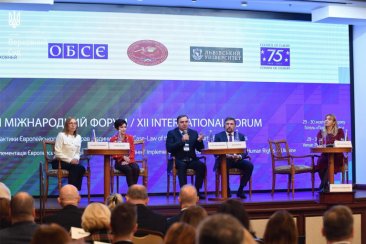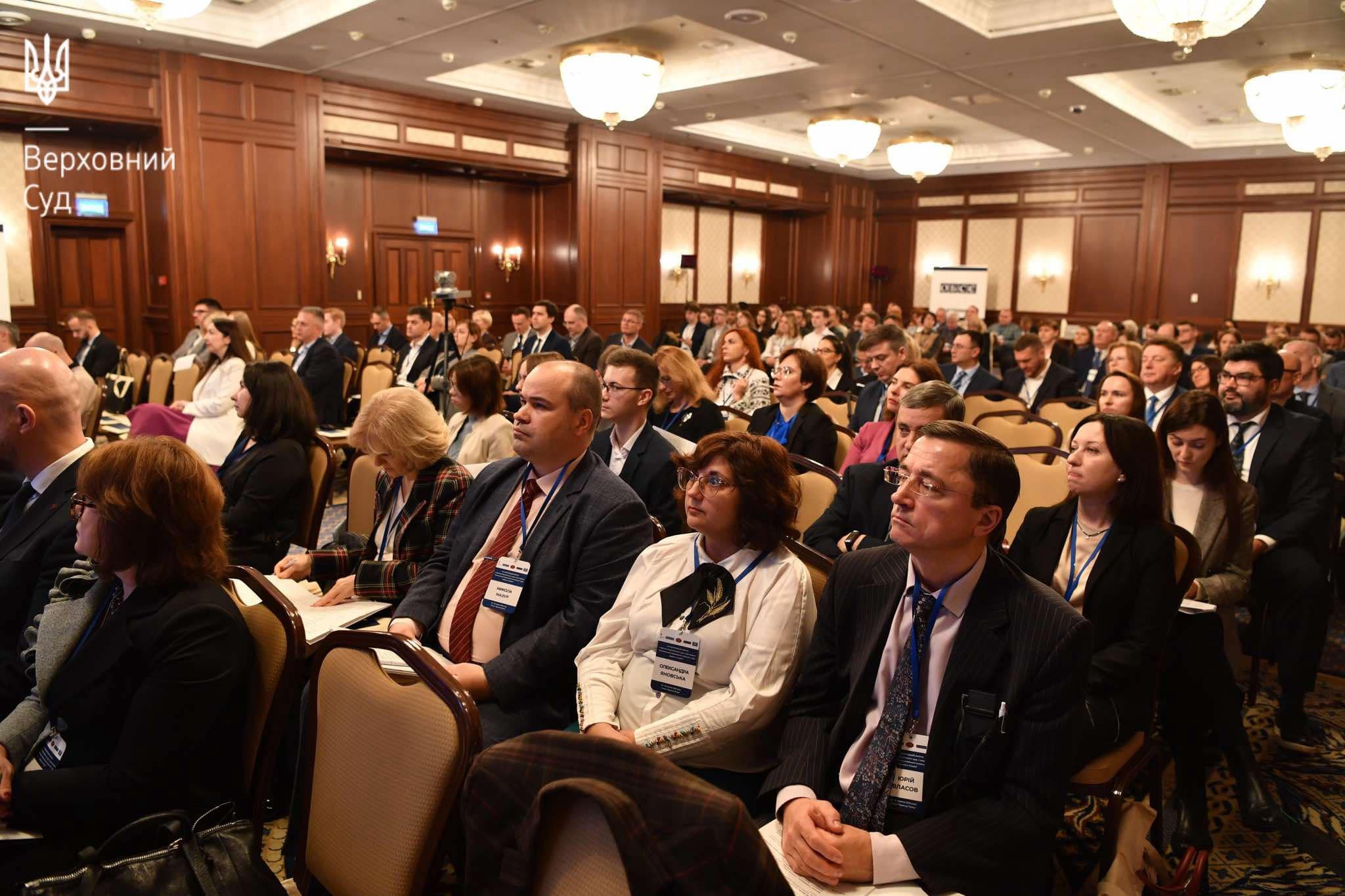Contact center of the Ukrainian Judiciary 044 207-35-46

The Supreme Court has always paid due attention to the implementation of the Convention for the Protection of Human Rights and Fundamental Freedoms and the case law of the European Court of Human Rights.
It is quite rare to find a court decision concerning complex legal issues that would not be based on the ECHR case law. In addition, a significant number of provisions of the current Criminal Procedure Code of Ukraine contain quotations from the ECHR judgments, which formulate positions on procedural issues. This indicates that national legislation and case law are being improved in sync with the development of the ECHR case law and the formation of new approaches to the application of the Convention.
This was stated by President of the Supreme Court Stanislav Kravchenko during the XII International Forum on the Case Law of the European Court of Human Rights ‘Implementation of the European Convention on Human Rights in Ukraine’.
For several years, the Supreme Court has been regularly preparing and publishing reviews of the ECHR case law. These reviews are sent to the courts of all regions and posted on the information resources of the Supreme Court so that judges can use them when considering cases. This is extremely important not only for Ukraine's fulfilment of its obligations to comply with the Convention, but also for the European integration process.
The process of negotiations on Ukraine's accession to the European Union is currently underway, and representatives of the Supreme Court participate in bilateral meetings between Ukraine and the European Commission in the framework of the negotiations, providing information in the context of the screening of national legislation as part of the steps that Ukraine needs to take in order to successfully complete this process. At the same time, the representatives of the Supreme Court see the requirements of the European Union and the requirements of the European Convention on Human Rights as coinciding.
According to Stanislav Kravchenko, Ukraine's judicial system can be proud of the fact that in the context of war it not only continues to function effectively, but also strictly adheres to the highest standards enshrined in the Convention and developed by the ECHR. By implementing the Convention, we are actually bringing our national legal system closer to the requirements of the European Union.

‘Every step is extremely important. This is our progress both in the negotiation process and in the development of national legislation. This year, we took another important step - we reached an agreement to translate the Knowledge Sharing Platform into Ukrainian. This is an important analytical resource that allows us to select relevant ECHR case law. We are currently actively working on the translation, and we hope that next year the materials posted on the platform will be available to users in Ukrainian. I am grateful for this initiative to the distinguished ECHR judge Mykola Hnatovskyy, representatives of the Council of Europe who help us in this direction, as well as representatives of the Supreme Court who are directly involved in this,' said the SC President.
Stanislav Kravchenko also expressed his gratitude to the OSCE Support to Ukraine Programme within the framework of the project ‘Safeguarding Human Rights through Courts, Phase II’, the Council of Europe projects ‘Support to the functioning of justice in the war and post-war context in Ukraine’, ‘Fostering Human Rights in the Criminal Justice System in Ukraine’ and ‘Strengthening judicial and non-judicial remedies for the human rights protection of the war-affected people in Ukraine’, the Law Faculty of Ivan Franko National University of Lviv and the National School of Judges of Ukraine for their support.
Maciej Janczak, Head of the Council of Europe Office in Ukraine, stressed that Ukraine is making enormous efforts not only to confront the aggressor state, but also to reform its legal system, strengthen democratic institutions and ensure the rule of law. ‘This is truly impressive and commands respect. The Council of Europe stands with Ukraine in supporting this joint activity of the government and society, and is expanding its presence in Ukraine to build the country's capacity to face the challenges it faces in the context of war,' said Maciej Janczak, adding that the Council of Europe Action Plan for Ukraine 2023-2026 currently includes 37 projects, and their number will continue to grow.
Ensuring the rule of law in the country is a joint effort of all state institutions and society. The judicial and law enforcement systems play a leading role in this process. The Head of the Council of Europe Office in Ukraine stressed that the Supreme Court is one of the most important institutions supporting human rights in times of war. Of course, when considering cases of compensation for damage caused by Russia's war against Ukraine, problems may arise with regard to compensation for damage caused by the war, so cooperation between national and international organisations will be necessary.
'The Council of Europe is ready to support Ukraine in developing its case law, as respect for human rights is extremely important in times of war. Together with our Ukrainian partners, we are developing ways of judicial protection for war victims and tools for compensation. In these difficult times of Russian aggression, we are together to ensure a lasting and just peace,’ said Maciej Janczak.

Addressing the participants on behalf of the Rector of the National School of Judges of Ukraine, Tetyana Fuley, Head of the Department of Scientific Research on Judicial Proceedings and Scientific and Methodological Support of Judicial Education of the National School of Judges, noted that the European Convention on Human Rights introduced a judicial mechanism for the protection of general standards of human rights and fundamental freedoms recognised by international law in the member states of the Council of Europe. The European Court of Human Rights, the Committee of Ministers of the Council of Europe, and the European Human Rights Training Programme for Legal Professionals HELP are examples of the effectiveness of the Convention mechanism established by the Council of Europe. This mechanism is a model for the formation of a supranational system of values and principles of human rights protection. The Convention mechanism has also had an impact on national legal systems, in particular in the context of shaping human rights practice and developing training and practice-oriented education for judges in line with international standards.
According to Nataliia Stupnytska, Head of the Democratization, Good governance, Rule of law, and Human Rights component of the OSCE Support Programme for Ukraine, this year's forum is dedicated to discussing the specifics of applying the principle of subsidiarity and its interpretation by the ECtHR; national court practice on compensation for war-related damage; improving the quality of legal education, etc. These issues are key in today's realities, because despite all the challenges caused by the Russian aggression against Ukraine, the judicial system has not stopped providing access to justice. In addition, the reform of legal education continues. Nataliia Stupnytska noted that since its inception in 2022, the OSCE Support Programme for Ukraine has continued to work to strengthen the resilience of Ukraine's social and democratic institutions and civil society, in particular through judicial reform, improving methods of teaching legal disciplines, ensuring access to justice in times of war, etc.
Andrii Hukaliuk, First Vice-Rector of Ivan Franko National University of Lviv, emphasised that one of the most important issues in the legal field today is improving the quality of legal education. In his opinion, effective training of lawyers will contribute to the fulfilment of all key tasks of the legal system, as the rule of law in the country begins with quality legal education based on the Council of Europe standards.
Volodymyr Burdin, Dean of the Law Faculty of the Ivan Franko National University of Lviv, noted that Russia's aggression against Ukraine has not negated European integration trends in our country in general, but rather has become a catalyst for this process in many areas. For example, in its resolutions, the Supreme Court refers to relevant judgments of the ECHR, the study of ECHR judgments has been included in the curriculum of leading law schools in Ukraine, the Rome Statute of the ICC has been ratified, and EU directives are taken into account when drafting laws. At the same time, according to Volodymyr Burdin, the challenges posed by the emergence of new categories of war-related cases require scientific understanding through the prism of potential review of national court decisions by the European Court of Human Rights in the future.
Noting the strength and resilience of the Ukrainian justice system, which continued to operate in the face of a full-scale war, Lilja Gretarsdottir, Head of Cooperation Programmes Division, Department for the Implementation of Human Rights, Justice and Legal Cooperation Standards, Directorate General for Human Rights and Rule of Law of the Council of Europe, assured that the Council of Europe is united with Ukraine in the face of Russian military aggression.
Lilja Gretarsdottir drew attention to the fact that the International Forum on ECHR Case Law has been providing the international community with an opportunity to reflect on the progress in the implementation of the European Convention on Human Rights since its ratification by Ukraine in 1997 for 12 years in a row. She assured that over 27 years, Ukraine has achieved significant results in both the implementation of the Convention at the national level and the adoption of the Convention standards. Progress is visible in all areas related to democracy, human rights, and the rule of law. Among the long-term changes is the reform of the judiciary, even in the context of the ongoing war, to bring Ukraine's legal system closer to the standards of the Council of Europe.
According to the speaker, the key step in this area was the reboot of the HCJ and the HQCJ of Ukraine. The next step should be to develop the proper functioning of these bodies based on the Council of Europe's standards for disciplinary procedures and the selection of new judges. This is a prerequisite for strengthening public trust in the judiciary. At the same time, Lilja Gretarsdottir warned that the presence of more than 2,000 vacant judicial positions could hinder the administration of effective justice, as the lack of judicial personnel causes excessive length of court proceedings, which is a violation of Article 6 of the Convention.
‘In the light of its European integration aspirations, Ukraine needs to build a strong and effective justice system. The Council of Europe can provide the necessary support in ensuring justice for war victims. In particular, the Council of Europe has initiated the creation of an international Register of Damages Caused by the Aggression of the Russian Federation against Ukraine. The international community approves the set of reforms implemented as part of Ukraine's transition from a post-Soviet to a democratic state and remains in solidarity with Ukraine,’ Lilja Gretarsdottir summed up.
The first day of the Forum can be followed at https://www.youtube.com/live/qlpkSa2SWbc.